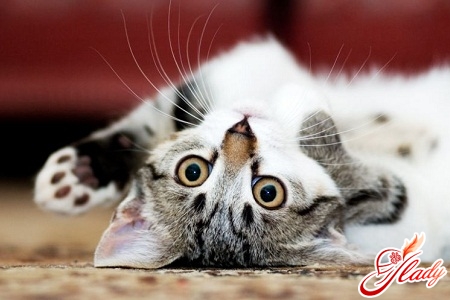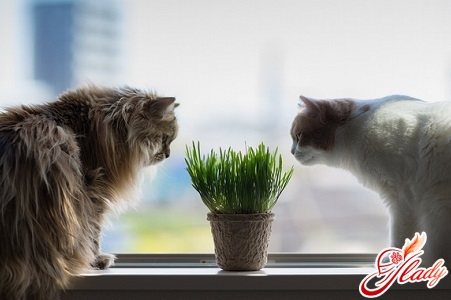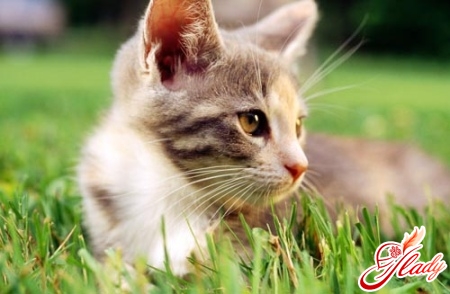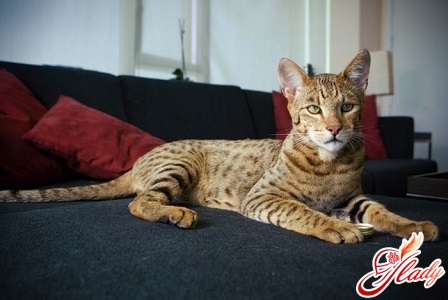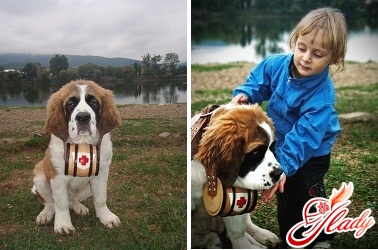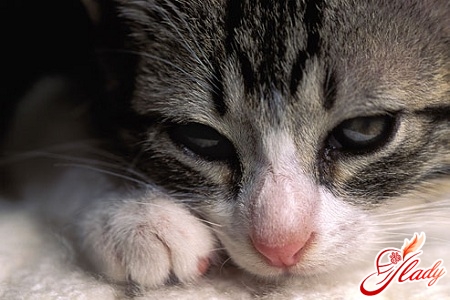 Such a nuisance as intestinal upset,is familiar to all of us firsthand. And, alas, not only to us (people). Animals also suffer from such disorders. And our kitties (adult cats and tomcats and small kittens) from time to time present us with such surprises as diarrhea. But diarrhea (you know) is not only loose stools, but also pain and colic in the abdomen, nausea, lack of appetite and, as a result, dehydration of the body. For a cat, this is stress, but such a nuisance is no less stressful for the owners of the animal. Therefore, the owners begin to panic and immediately begin to treat the cat. However, diarrhea is not a disease, but a symptom. By the way, diarrhea in cats can be caused not only by diseases, but also by stressful situations.
Such a nuisance as intestinal upset,is familiar to all of us firsthand. And, alas, not only to us (people). Animals also suffer from such disorders. And our kitties (adult cats and tomcats and small kittens) from time to time present us with such surprises as diarrhea. But diarrhea (you know) is not only loose stools, but also pain and colic in the abdomen, nausea, lack of appetite and, as a result, dehydration of the body. For a cat, this is stress, but such a nuisance is no less stressful for the owners of the animal. Therefore, the owners begin to panic and immediately begin to treat the cat. However, diarrhea is not a disease, but a symptom. By the way, diarrhea in cats can be caused not only by diseases, but also by stressful situations.
What causes diarrhea in a cat?
Even if your pet is healthy, the following reasons can cause diarrhea.
However, all these are easily eliminated causes of diarrhea. Things are much worse if the cause of diarrhea is illness. What illnesses are accompanied by diarrhea?
But don't panic and cry at the thought.about your pet's fatal illness. If your beauty (or beauties) is vaccinated, if she does not come into contact with stray or wild animals, then the cause of the diarrhea is most likely not a particularly dangerous disease. Or not a disease at all, but a nervous or eating disorder. You just need to analyze the situation and take the first necessary measures.
How to treat diarrhea in a cat?
First of all, take another close look,what you feed your pet. Fatty meat, raw fish and liver, fresh milk often cause intestinal disorders. However, there may also be an individual intolerance to some products. In this case, simply exclude from the menu everything that could cause diarrhea and put the animal on a short-term diet. Overfeeding is manifested by a single plentiful and loose stool. In this case, you need to reduce the portions and frequency of feeding. If a possible cause was a change in water, then give the cat its usual water to drink. If you are transferring the animal to new food, then do it gradually, adding small portions of the new food to the usual products. If diarrhea began in a small kitten that you just acquired, then most likely this is a reaction to a change in diet and weaning from mother's milk. In this case, diarrhea will quickly pass "on its own". If the baby continues to suffer from diarrhea, then it may be caused by intestinal parasites. In this case, it is necessary to give the kitten anthelmintic drugs and show it to the veterinarian. Mild intestinal disorders, accompanied by short-term and not profuse diarrhea, without fever and general weakness, can be treated at home. To do this, you need to stop giving the animal food for 24 hours (for kittens - no longer than twelve hours). At the same time, it is necessary to provide the animal with constant access to clean and fresh (boiled) water. In addition to taking such emergency measures, you need to give the cat activated charcoal twice a day at the rate of "one tablet per ten kilograms of weight" and drink it with a decoction of pharmacy chamomile or St. John's wort (five milliliters at a time). To give the cat medicine, dissolve the activated charcoal in boiled water. Draw the charcoal solution or herbal decoction into a syringe (without a needle), lift the animal's head and, holding it by the chin, insert the tip of the syringe between the cat's teeth and pour the medicine into the mouth. As soon as the sick animal's condition begins to improve, start giving it easily digestible food: boiled chicken meat (white), boiled egg yolk, boiled rice. By the way, baby meat puree or special dietary pates for animals are suitable as dietary food for a cat. The main thing is that the food is low-carbohydrate. On the first day after therapeutic fasting, you can give only half of the usual food norm, and return to the usual diet only after complete recovery.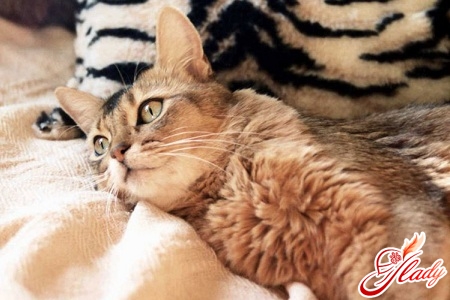
When should I see a doctor?
In no case can you exclude the possibility of diarrhea in a cat due to serious diseases. In what cases is it necessary to contact a veterinarian?
With similar symptoms accompanying diarrhea,you need to urgently take the animal to the doctor or even call an ambulance. Your cat will be examined, diagnosed and prescribed treatment. If your pet is found to have parasites, you will begin the appropriate course of treatment. The animal will be prescribed special drugs with a certain regimen and a diet. Usually in such cases, the treatment is repeated: after a few weeks - a second course. If dehydration has already occurred, then most likely the animal will be prescribed IVs: intravenously or subcutaneously. You will have to bring the cat to the clinic or call a specialist to your home. In any case, this procedure is necessary, since with diarrhea, the liquid drunk by the cat leaves the body too quickly. If diarrhea is caused by an infection, the animal will be prescribed a course of antibiotics. So do not rely on chance. In severe cases, diarrhea will not go away on its own. Trust the doctor and approach the treatment responsibly. After all, your cat trusts you and expects help from you. Do not disappoint her hopes. And to prevent intestinal disorders, feed the animal properly, vaccinate on time, give anthelmintic drugs at least once a season. And be healthy (both you and your cat)! We recommend reading:




